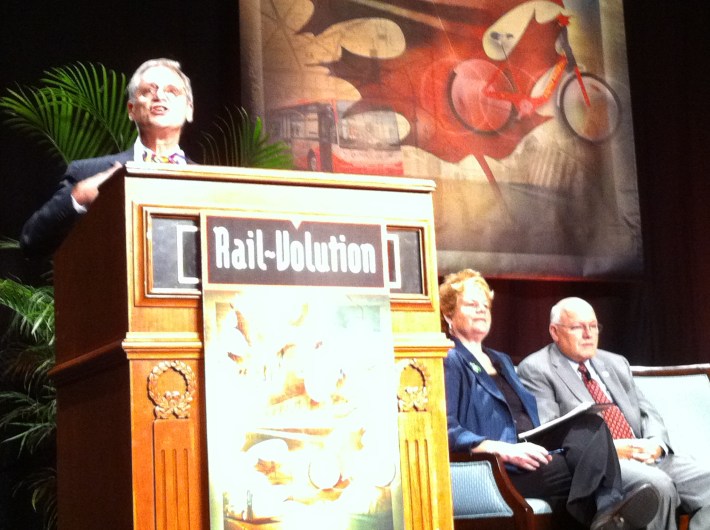At Rail~Volution yesterday, Rep. Earl Blumenauer (D-OR) -- also known as the godfather of the “rail~volution” -- said even he wouldn’t raise the gas tax right now.

“We should make some adjustments to a gas tax that hasn’t increased since 1993,” Blumenauer said. “Half the people think the gas tax goes up every year.”
He said he’d like to see it indexed to inflation:
In an ideal world, I would not raise the gas tax this year or next year. Come out of this recession, but put in place increases that are going to occur over the next 10 years; have that revenue stream. I would borrow against the revenue stream to take advantage of record low interest rates and a bidding climate like we’ve never seen, fund the president’s infrastructure bank to help move some of these forward, and work toward replacing the gas tax.
He reminded the audience that his state was the first to institute a gas tax, and now Oregon is working to get rid of it and replace it with a vehicle miles traveled fee.
Bill Millar, the outgoing president of the American Public Transit Association (“on Halloween, I turn into a pumpkin!”), said that before switching to a VMT fee, Congress needs to eliminate the federal guarantee, called "equity bonus," that states will get back at least a certain percentage of what they pay in gas tax receipts. (The GAO recently found that every state actually gets back more than it puts in, thanks to infusions from the general fund, but that hasn’t stopped a lot of states from complaining that they don’t get their fair share.)
“States that encourage more travel get more money back [under the equity bonus system],” Millar said, “so we’ve got to break that cycle too, to make sure instead it’s an inverse relationship and states that give people more choice, more ways to travel, get more federal aid, not less federal aid.”
Millar thinks the answer is simply to raise the gas tax. And he doesn't agree that it needs to wait. After all, the average price of gas in America went up by seven cents this week, he noted. But did anybody notice? “If you told Americans that, they wouldn’t like it, but hey, it’s gas, what can you do?” he said.
Either way, the U.S. has got to do something to avoid running up the deficit. Congress can continue to run up an infrastructure deficit, Blumenauer said, which will cost far more in the long run. Or the country can keep spending even the meager amount it does now on transportation maintenance and the Highway Trust Fund will run dry, requiring another general fund transfer, which adds to the deficit.
Why can’t Congress move forward on any path out of the current fix? Transportation Secretary Ray LaHood has been pretty open with his frustration lately. “The last election elected about 70+ new members of the House,” he said at Rail~Volution. “About 30 or 40 of those people came here to do nothing. And that’s what they’ve done.”
Blumenauer noted that his first public event in Congress was a bipartisan press conference with LaHood, then a representative from Illinois. They had called for civility in Washington.
“In the days when I served with Earl and others, there was a good mix of policy and politics,” LaHood said. “Unfortunately, today, the policy part has dropped off and it’s all politics. It’s all about the next election.”
He fumbled his call to action, though. “Everyone in this room has a member of Congress; everyone has two senators,” he said – momentarily forgetting, I guess, that he was talking to hundreds of people in Washington, DC, where 600,000 residents have neither. Just the day before, Mayor Vincent Gray had buttered up the Rail~Volution audience by talking about the Dulles rail extension and streetcars, and ended by asking the audience to push for democracy for DC so that residents there can be represented like everyone else as Congress debates the issues of the day.
For example, the jobs bill: That’s what LaHood wanted everyone to call up their members of Congress about. Or passing a “five-year” [sic] transportation bill.
Bill Millar reminded the audience that transit activism isn’t just about those big federal-level initiatives that get caught in big federal-level partisan gridlock. Eight cities and towns will vote on transit-related ballot initiatives in November. Millar noted that on the very same day last November when the American people voted in a new class of self-styled fiscal hawks, they also voted nearly three-to-one in favor of pro-transit measures – even when they involved taxation.
“You can’t rest when you get home!” Millar exhorted Rail~Volution attendees.
They gave him a standing ovation.





